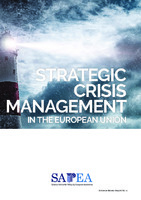Strategic crisis management in the European Union

Review Report
Συγγραφέας
Science Advice for Policy by European Academies
Ημερομηνία
2022-11-22Προβολή/
Θεματικές επικεφαλίδες
Crisis Management ; System breakdown ; Globally pervasive risksΠερίληψη
This chapter provides the introduction to this Evidence Review Report, and sets out the
frame and purpose.
The report’s aim is to inform the Group of Chief Scientific Advisors to the European
Commission by providing evidence to answer the questions put forward in the scoping
paper:2
Based on a broad and multidisciplinary understanding, how can the EU improve its strategic
crisis management?
The Scoping Paper formulates the formal joint request for advice from the Commissioner
for Research and Innovation and the Commissioner for Civil Protection and Humanitarian
Aid to the Group of Chief Scientific Advisors (see Annex 2 for information about the
background on this report). The focus on European strategic crisis management implies
that the Evidence Review targets the policymakers and decision-makers who are
responsible for facilitating and coordinating crisis management across the member
states, rather than providing operational guidelines.
This report warns that crises are becoming increasingly frequent, complex, protracted
and compound in nature. As such, they can cascade into other sectors, regions, and
nations, making them transboundary. For policymakers, overlapping ‘polycrises’ will be
characteristic of the future. This trend also implies that the conventional lines between
crises, risk and resilience is becoming blurred. Therefore, this report is based on
multidisciplinary evidence from academia and practice rooted in the areas of crisis, risk
and resilience.
Αριθμός σελίδων
310p.Γλώσσα
ΑγγλικάΣημείωση
DOI 10.26356/crisismanagementDownloadable from https://www.sapea.info/crisis
Informs the Scientific Opinion of the European Commission Group of Chief Scientific Advisors
SAPEA is part of the European Commission’s Scientific Advice Mechanism, which provides independent, interdisciplinary, and evidence-based scientific advice on policy issues to the European Commission.
